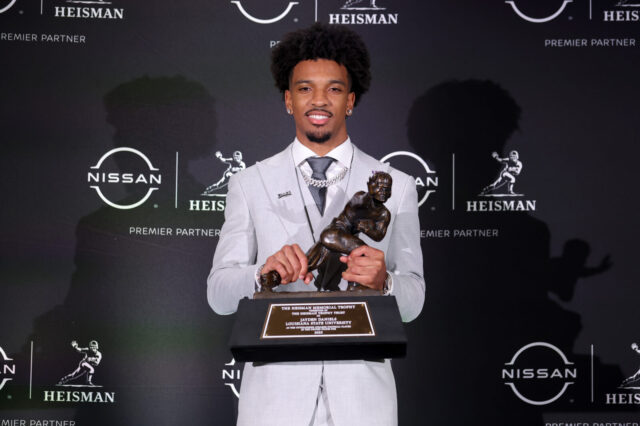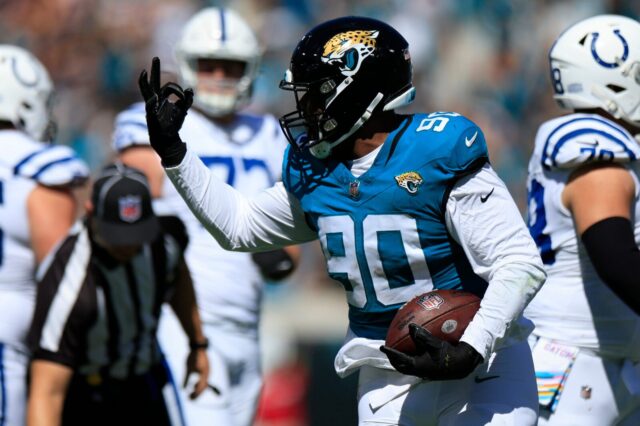Typically, when a team applies the franchise tag to a player, it is a last resort to keep that player on the team. Typically, the franchise tag pays a player top dollar for one year of work. Typically, the team and player will agree on a long-term contract extension before the July 15th deadline, and the franchise tag will never be signed.
However, Von Miller is not a typical player. Miller and the Denver Broncos are in a rare position where the franchise tag happens to be the most affordable option the team has.
The franchise tag allows a team to keep one of its potential free agents for one more year at the expense of paying that player as one of the best at his position. The franchise tag salary is determined by averaging out the top five salaries of that player’s position or 120% of that player’s salary from the year before, whichever number is greater.
But what happens when that player’s value is significantly more than the franchise tag salary? That is the situation that the Broncos and Miller are looking at right now.
On March 1st, the Broncos placed the exclusive franchise tag on Miller, which will pay him a guaranteed one-year contract worth just over $14.1 million for the 2016 season. The Broncos and Miller still have until July 15th to work out a long-term deal, and if one is reached, then the franchise tag will not be used.
While $14.1 million is a lot of money, even for NFL players, it is considered a bargain when it comes to Miller. After Miller’s first five seasons in the league, and after dominating the Broncos’ Super Bowl run last year, many believe that Miller could become the highest paid defensive player in league history.
Ndamukong Suh set the mark last offseason, signing a six-year deal worth $114 million with the Miami Dolphins. Coming into this offseason, Miller’s value was thought to rival Suh’s $19 million a year. However, in just the first month of the new football year, Miller’s value has continued to increase.
Jason Cole reported that Miller is seeking $22 million a year and said that some NFL executives believe he could command $24-25 million a year on the open market.
Insider Buzz: Von Miller Extension Could Exceed $20 Million Per Year https://t.co/Q1wDezUIIl via @bleacherreport
— Jason Cole (@JasonCole62) March 25, 2016
This leaves the Broncos with a few options: they can work out a long-term deal with Miller now, paying him roughly $19-22 million a year going forward; they can have him play the 2016 season under the franchise tag, allowing Miller to reach free agency next offseason; or they can keep Miller on the franchise tag for the 2016 season and the 2017 season..
While all of these options will cost the Broncos a lot of money, now and in the future, the last option would be significantly cheaper for the next few years. The franchise tag can be used on the same player in consecutive years; however, this is very rare. In nearly every scenario, slapping the franchise tag on a player in consecutive years is simply too expensive for a team to even consider.
Von Miller may be the exception.
If a team chooses to place the franchise tag on a player for a second consecutive year, the price comes at a 120 percent increase of the previous year’s franchise tag number. Since the first-year franchise tag price is already the average of the top five salaries of that player’s position, the 120 percent increase is a steep price to pay.
If the Broncos were to do this with Miller, next year he would cost the Broncos about $16.92 million. Even at the 120 percent increase, Miller would still be $2-6 million under value, and that’s not even taking into account a continued increase in his value.
The franchise tag can be used for a third consecutive year at an even increased price. If a team chooses to do this, it will cost them 144 percent of the previous year’s salary or the equivalent of the highest-paid position’s franchise tag (quarterback), whichever is higher. For the 2018 season, if the Broncos were to place the franchise tag on Miller, he would cost $24.36 million. While this is greater than the $22 million Miller may be asking for, it’s less than the $25 million Cole said Miller could garner on the open market.
Not to mention, while it is difficult to forecast a player’s exact value in future years, if Miller continues to play at the level he has in his first five seasons, there’s no doubt his value will continue to increase each year, especially as the league’s salary cap continues to grow. If this happens, then the $19-25 million that Miller could get this year could be worth even more after next year and the year after.
If the Broncos decided to franchise tag Miller three consecutive years at the prices mentioned above, he would cost them a total of $55.38 million, an average of $18.46 million a year. If Miller were to sign a long-term deal now, he could probably command $20-22 million a year. Over the next three seasons, if the Broncos were to franchise tag Miller each year, they would be saving an average of about $2-4 million per year as opposed to giving him a long-term contract now.
Another advantage of the franchise tag would be that it makes every year a contract year for Miller. In contract years, players can sometimes have the best years of their career, because they have an opportunity to receive a new contract the following year and want to impress teams as much as they can. If Miller were in this situation for three years in a row, it would give him extra incentive to stay focused and work his very best each of these three years instead of letting him get complacent.
If Miller were to continue the path he is on now of being one of the best players in the game, after the third year of being franchised tagged there is no question his value would be through the roof and the Broncos could still be set to pay him the biggest defensive contract in NFL history. This is something the Broncos would live with because they would have just saved $9-15 million over the past three seasons and Miller would have continued to prove that he is one of the most dominant players in the NFL.
There is no doubt that one day Von Miller will sign one of the biggest defensive contracts in NFL history, if not the biggest. If the Broncos could save millions a year for the next three years by franchise tagging him, why would they not go down this unconventional route, or at least explore this opportunity?
The one caveat, of course, is that a plan such as this will undoubtedly make Miller unhappy. Whether that leads to an extended holdout or something else, it’s hard to imagine there won’t be repercussions of some sort. Still, the cards are in the Broncos hands. We’ll see what they do.



